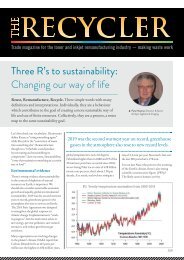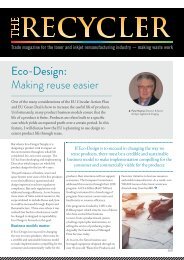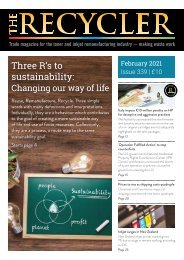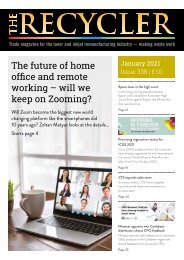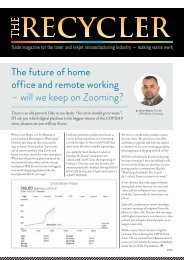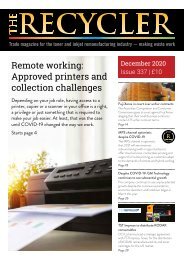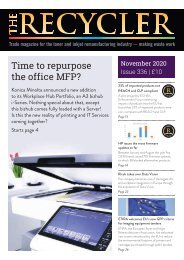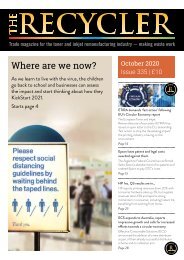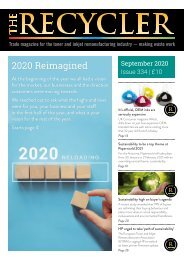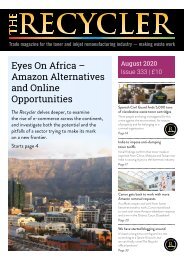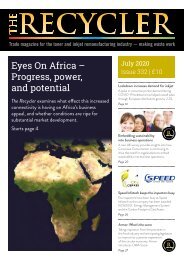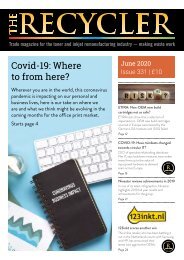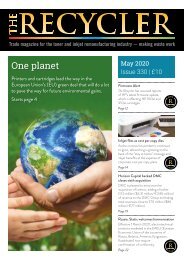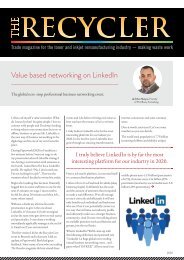The Recycler Issue 317
Create successful ePaper yourself
Turn your PDF publications into a flip-book with our unique Google optimized e-Paper software.
FEATURE<br />
Business booming in Bucharest?<br />
Three decades since the revolution, and twelve years on from its<br />
ascendancy to the European Union, the Romanian economy looks to be<br />
moving towards the light, after years of being seen as the ‘sick man of<br />
Europe.’ But with plenty of challenges, new and old, ready to rear their<br />
head, are the times of turmoil truly over, and is Romania ready to<br />
embrace the present, and the future?<br />
Towards the end of 2017, <strong>The</strong> Guardian<br />
reported that the Eastern European<br />
nation’s economy was “booming,” owing<br />
to a combination of EU accession,<br />
government-led injection measures, and<br />
“communist-era educational excellence.”<br />
Its economic growth has been boosted<br />
further in recent years by the arrival of<br />
many major global players, including<br />
mobile phone titan Siemens, personal<br />
exercise technology company Fitbit, and<br />
household appliance monolith Bosch, all<br />
of whom have either set up new<br />
operations or expanded pre-existing ones.<br />
Car giants Ford recently announced plans<br />
to hire 1,000 new workers for its plant in<br />
Craiova, in the south of the country<br />
(taking its total workforce to nearly<br />
4,000) and has invested more than €1.2<br />
billion ($1.35 billion) in its Romanian<br />
operations since 2008.<br />
In terms of pure numbers, the<br />
Romanian economy grew 5.7 percent<br />
year-on-year in the second quarter of<br />
2017 – more than double the average EU<br />
growth rate of 2.4 percent. This follows a<br />
GDP rise of 3.9 percent and 4.8 percent<br />
in 2015 and 2016 respectively, with the<br />
International Monetary Fund forecasting<br />
at the time that the economy would have<br />
grown by 5.5 percent for the whole of<br />
2017.<br />
<strong>The</strong> tech sector is showing particularly<br />
fast expansion, owing partly to the legacy<br />
of excellent scientific, mathematic and<br />
technical education left over from the<br />
nation’s Communist past. Although, like<br />
many former Communist states,<br />
Romania has a chequered history, it is<br />
now seeing one of the benefits of its<br />
previous didactic regime.<br />
<strong>The</strong> country’s strong language skills<br />
have also contributed, helping to<br />
establish Romania as a hub for IT<br />
outsourcing. This flair for linguistics can<br />
be partially explained by the language’s<br />
Latin, rather than Slavic, roots, but also<br />
by more societal factors, such as that<br />
foreign programming on Romanian<br />
television is subtitled, rather than<br />
overdubbed, ingraining an exposure to<br />
other tongues into the consciousness of<br />
wider society.<br />
Industry insiders predict the tech sector<br />
will double its share of the GDP by 2025,<br />
taking it to 12 percent - partially thanks<br />
to some of the fastest broadband speeds in<br />
the world, that in 2017 were behind only<br />
four countries in the world (Singapore,<br />
Hong Kong, South Korea, and Iceland).<br />
Similarly, the services sector continues<br />
to expand, as do exports and<br />
manufacturing. Private consumption,<br />
meanwhile, hit a nine-year high in 2016<br />
and increased by 8 percent again in the<br />
first half of 2017.<br />
Whilst accession to the EU has<br />
contributed to Romania’s increased<br />
economic stability, so too have<br />
Government measures: A 5 percent cut in<br />
VAT, to 19 percent, since 2015, and a<br />
doubling of the minimum wage have<br />
both helped stimulate growth.<br />
Wages still present an interesting<br />
conundrum, however, as despite recent<br />
growth, they still sit well below the EU<br />
average, and in 2017 were the second<br />
lowest in the whole bloc, with only<br />
Bulgaria paying its employees less on<br />
average. Whilst problematic for workers,<br />
it has had the effect of turning Romania<br />
into an attractive outsourcing option,<br />
which has provided the national<br />
economy with a ‘shot in the arm.’<br />
“<strong>The</strong> establishment of the Single<br />
European Market has allowed the free<br />
movement of goods, capital, and labour,”<br />
observed Victor Matache, General<br />
Manager of Romanian distributor Toko,<br />
who explained to <strong>The</strong> <strong>Recycler</strong> that “the<br />
free movement of goods allowed large<br />
European wholesalers to enter the<br />
Romanian market directly,” but that on<br />
the other side of the coin, “the<br />
distribution business model for<br />
Romanian capital companies is restricted,<br />
due to the big European distributors.”<br />
As well as the big worldwide names<br />
like Bosch, Fitbit, and Ford, Romania’s<br />
remanufacturing industry has also felt<br />
the benefit of the economic upturn,<br />
with both Turbon and Static Control<br />
planting a flag for the aftermarket in<br />
recent years.<br />
Static Control partnered with three<br />
separate resellers in the country in 2016,<br />
with new alliances inked with Toko, Sky<br />
Group, and Timi Import Export. Speaking<br />
at the time, Static Control made clear its<br />
delight with the move, which brought on<br />
board “a combined total of more than 50<br />
years’ knowledge and experience of the<br />
imaging industry in Romania.”<br />
“Static Control is committed in its<br />
support of the Eastern European region<br />
and the territories within it,” said<br />
Regional Sales Manager Andrzej Jaswin.<br />
“Sky Group, Toko and Timi Import Export<br />
all bring a wealth of expertise from the<br />
perspective of both the territory and the<br />
industry itself, placing us in the best<br />
possible position to deliver the timely and<br />
efficient service this growing region<br />
demands.”<br />
Jaswin added he was “delighted to<br />
make this development within the<br />
Romanian market with these highly<br />
respected resellers.”<br />
Another aftermarket player making<br />
huge waves in Romania is remanufacturer<br />
TIN Factory, which has opened<br />
two brand new shops in recent years, as<br />
part of a shift in business strategy.<br />
“It was our way to survive,” the<br />
company’s CEO Milan Banjac told <strong>The</strong><br />
<strong>Recycler</strong>. “We stopped distributing,<br />
stopped selling at small Chinese prices<br />
and greater quantities, and started to sell<br />
just to end users. It was a good decision.”<br />
Toko’s Matache also extolled the<br />
virtues of transforming a business in<br />
response to the changes. “For Romanian<br />
companies, it becomes more sustainable<br />
to develop a business that adds value,” he<br />
explained. “Because the volume and<br />
value of our affiliate business have been<br />
declining for years, we have begun to<br />
develop a new business model. We<br />
36 THE RECYCLER • ISSUE <strong>317</strong> • APRIL 2019




